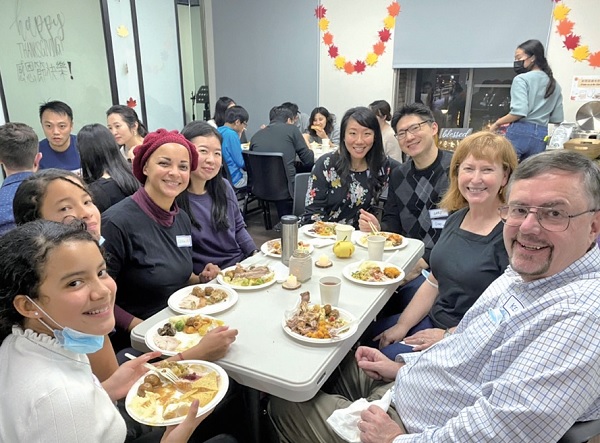Cultivating Church Planters with DNA
【Church and Church Planting】Series 2
Oral narration/Peter Wang
Interview/Liao Meihui

"Church planting is an art, not mechanical or magic. The most important thing is the mentality and DNA of the church planter." Pastor Peter Wang, who has just turned 50, has participated in four church plantings. The most recent time was in 2021 when I left Taipei Christian Church to plant a church and established Linkou International Christian Church.
From the first article in this series, he reminded readers: Through church planting, churches can be found everywhere, and each ethnic group can have its own spiritual home, spread the gospel widely, and implement discipleship training. In this interview, he will focus on the characteristics of church planting and the cultivation of church planters.

▲The church is a living organism that values “relationship” and “intimacy.”
Church planting is different from cell groups
K: Why is there so much emphasis on small churches and church planting? What are the similarities and differences between church planting and cell groups?
king:The shortcomings of megachurches mentioned in the last issue once again indicate that they are not dissatisfied with large churches. But when a church organization becomes large, it is easy to become rigid. There is a saying that "from luxury to simplicity". Megachurches stifle the living space of small churches, but it is difficult for them to develop the "relationship" and "intimacy" that church members should have.
The early church was a "small but beautiful" small church model. Small churches are living organisms. They do not have the comfort and care of large churches. Instead, they have the opportunity to practice spiritual growth, and they also experience the pain of growth. Of course, if they are healthy enough, they will continue to pioneer; sometimes they will suffer from spiritual illness and may eventually die. Death is a natural part of life, but new life (church planting) continues to spring up in various places. Because I firmly believe that from the early church to the present, God is absolutely capable of protecting His own reputation.
Cell groups, which became popular in the 1990s, have been established and operated in many Chinese churches. What church planting and cell group churches have in common is growth and expansion, but they are still different in nature. Cell group churches will eventually form megachurches. A church plant is a church that is independent from the parent church. It has a small number of members and can initially be in a believer's home or rent a venue. Once there is insufficient space or the number of people increases to a certain level, another space will be opened up. And each church plant has its own leader, and authority comes directly from Christ, not from the church’s hierarchical organization.
Cell groups are generally still within the structure of large churches. They only divide members into small groups and do not have independent church functions. The authority of the cell group comes from the senior pastor, and is led from top to bottom by the leaders of each group. The small group is restricted by layers of restrictions, and it is difficult for the senior pastor’s vision to be directly conveyed to every member. On the other hand, although the number of church members in a church is small, it is still a church structure and a body that continues to multiply through church planting, spreading the gospel throughout the ethnic groups.
Church planting is not entirely a “family church movement,” because it does not just happen in “homes.” It may also be achieved through online cooperation, such as cooperating with another church alliance to establish a bilingual church planting church or a church planting church for a certain ethnic group. The form can be diverse.
K: Please share your unforgettable experience in church planting.
king:Let me share a little story first! God once healed my grandfather, so my grandma made a wish to God - "God! Choose any one of my children and grandchildren to serve you!" So my grandma's son, my uncle Wang Jixiong, became a missionary. , serving in Northern Thailand for more than 40 years. Among my grandma’s grandchildren, I was chosen and I knew from an early age that I would serve God all my life. Grandma’s agreement with God was fulfilled in this way!
God’s family is unique, and so is church planting. Every church planting has some basic elements, but also has its own unique aspects. Because church planting is an art, not mechanical or magic.
I am now 50 years old and have participated in four church plantings. He immigrated to the United States with his parents at the age of 14. After graduating from Gordon-Conwell Theological Seminary, he returned to Northern California to pastor a church, during which he experienced two church plantings. God led me back to Asia a few years ago, and in 2018 I went to China to plant a church. This was an unforgettable and successful church planting model. I have been betting on this new church for three years and have seen the support funds decrease year by year from 100% to 60% to 30%. Three years later, the church became completely independent and has now trained its own team of about 30 to 40 people. Even so, we continued to keep in touch. During the epidemic, we could not meet physically, but we often got together online and encouraged them to continue to develop.
The most recent experience was to participate in the church planting of Taipei Christian Friends Church in 2021 and the establishment of the International Christian Friends Church in Linkou. The characteristic of this church plant is its internationalization. Almost all members are bilingual and come from different backgrounds and countries. This is an international group of Christians dedicated to bringing the true light of the gospel into Linkou; to grow, be equipped, and empowered together in sound relationships; and to transform the world with mission-minded leaders and biblical truth.

▲Linkou International Church of the Faithful, which was planted in 2021, has members from different countries and backgrounds. They are committed to bringing the true light into the community, growing in sound relationships, and transforming the world with truth. (Photo courtesy: Peter Wang)
The DNA of a Church Planter
K: What are the characteristics of a church planter? How should the church cultivate and prepare church planters?
king:The development of all ministries begins with people’s willingness to follow God; church planting does not fall from the sky or appear out of thin air. The first step must start with church leaders who have a vision and vision for church planting. Even if you have no church planting experience in the past, it does not mean that you will not plant churches in the future. Pastors must begin to pay attention to the issue of church planting and understand the characteristics of those who may participate in church planting, and then cultivate them. In addition to their passion and calling for the Great Commission of evangelism, the church planters I have observed and interacted with also have the following seven DNAs:
1) Flexible and adaptable:Can accept failure better than the average person; reacts faster and makes appropriate adjustments when faced with different situations.
2) Generalist rather than specialist:Church planters may not necessarily be preaching pastors, but they must have basic skills in discipleship training, be able to lead Bible studies, care, plan and execute, and like to get in touch with new people and things. In short, it is best to have some skills in all kinds of martial arts. No need to be a PhD or seminary student.
3) SensitivitysharpObserver:Able to integrate into contextualized and localized church planting, especially for cross-cultural ethnic groups, and be able to sensitively identify needs and then pastor.
4) Don’t stick to step-by-step procedures:Many young people like to break the rules and establish rules that suit them. The so-called step-by-step process here refers to following a linear process in terms of ideas and practices. The second step can only be followed by completing the first step. Pastors had better be mentally prepared and magnanimous to accept leaps and spirals of progress. It is not necessarily a bad thing to not follow the path of predecessors.
5) The will to suffer:Church planters are willing to leave their comfort zones, take up their cross and follow Jesus. This is a challenge to all Christians, myself included.
6) Actionists:Without action, everything is just talk. According to church planters who have experience in rapidly multiplying churches, six months is a suitable length of time to complete a church plant. Action church planters have the advantage of being fast and accurate.
7) The ability to make non-Christian friends:This may seem simple, but it is key. According to incomplete statistics, Christians will gradually leave their non-Christian friend circles about 18 months after they believe in Christ; once they leave the non-Christian friend circle, they will become accustomed to being in the bubble of Christian friends for a long time. Church planters must develop the ability to proactively and intentionally make non-Christian friends.
Discovering and cultivating churches does not happen overnight. Church leaders need to deliberately cultivate church planters, give them a certain degree of freedom, and support them in starting churches. Here are some practical suggestions:
• Starting with medium and short-term missions:Church planters have great enthusiasm for evangelism. The pastor should actively support them, invite them to participate in door-to-door missions, or cross-cultural short-term and medium-term missions, and provide opportunities to host evangelistic meetings and related trainings.
• Rotations and internships:To imitate the reserve managers of large companies, they need to intern in different departments to understand the company's operations. Similarly, let church planters participate in the five major departments of the church (missions, worship, teaching, fellowship, and ministry) and learn to serve from different experiences.
• Manufacturing Opportunities:Introduce seekers in gospel classes or new Christians to church planters. Church planters start evangelistic discussion groups among newcomers. As more and more people believe in the Lord and become disciples, it develops into a new church, which is an opportunity for church planting. For example, a new resident becomes a believer, and then brings his family and friends to participate in activities and gatherings, and continues to preach the gospel and disciple the church. After it gradually takes shape, it is a church planting with the new resident group as the backbone.
Church planting is for the purpose of prospering the Lord’s Word and glorifying God
K: How to evaluate the success of church planting? What mentality should church planters have and what principles should they adhere to?
king:The success of a church plant cannot be evaluated in numbers. It is not about the increase or decrease in the number of chairs in the church, nor about financial independence; it is about the continued maturity of the Body of Christ and its growth under the will and leadership of God.
The core of church planting is the power of God in it. Co-workers who have experienced church planting will unanimously admit that it is God who accomplishes great and awesome things in it; God is the leader, and humans are just collaborators. Church planting is a way for God to attract the vast number of lost people to come to Him and enter the saved community. What we ultimately hope for is the glory of God, not the expansion of the church; the focus is the salvation of Christ, not methods or models.
The mentality and principles of church planters can be summarized into the following three “no’s”:
1. Church planting is "not" another project of the church: it is part of the church's DNA. Wherever you see the need for the gospel, build the church there. Church division cannot be counted as church planting. What church planting requires is an attitude of self-denial; church planting itself is not an end, but one of the ways to achieve it. Church planters must be careful not to get carried away with excitement and regard planting a new church as an idol, which could lead to disaster.
2. Church planting is “not” a church growth movement: If the goal is to make the church larger and have more ministries, then you are going in the wrong direction. "Small but beautiful" is the principle that church planters should abide by.
3. There is not just one model for church planting: there may be basic SOPs for church planting, but that does not mean that the same method can be used every time. The church is an organism and needs to adjust its outreach methods based on many factors such as the target group, geography, and cultural background. There is no standard model that can be applied.
K: Please give Chinese church leaders some advice on church planting.
king:I pay special attention to the development of the Chinese church in North America, and I have also seen the growth of the church in Asia. I would like to emphasize again and appeal to the pastors and elders of large Chinese churches around the world: thank them for serving that generation over the past few decades. While they still have influence, help the next generation, empower the next generation, pay attention to church planting, and pioneer church planting. There are never too many churches to plant, and we need visionary pastors to lead from top to bottom, find a generation with the DNA of church planting, and invest resources in church planting as early as possible. Thanks to the senior pastors and elders for helping to set the stage, let these enthusiastic church planters continue to shine for the Lord! As the scripture says:"The word of the Lord increased greatly and prevailed." (Acts 19:20)
What impact does church planting have on believers and communities? What difficulties might you encounter? Please look forward to what Pastor Peter Wang will share in the next issue of the [Church and Church Planting] series.
Rev. Dr. Peter Wang
in Pastoral Studies from Gordon-Conwell Theological Seminary. With more than 20 years of pastoral experience, he has a strong commitment to emotionally healthy spirituality, church leader leadership and organizational development, postmodern gospel outreach, church planting, etc. Participates in teaching, counseling, and assisting with outreach in churches, seminaries, and Christian institutions. Pastor Wang and his wife Ann have a daughter.
He is currently the Director-General and Chairman of the Chinese Bible Mission (CBM) (U.S.A.); the founder and Chairman of the International Christian Association; a director of the Taiwan Christian Missionary Association; a director of the Taiwan Pioneer Youth Development Association; (U.S. ) Visiting professor at Christian Witness Theological Seminary; Visiting professor at (Hong Kong) Grace Biblical Seminary.
Liao Meihui, a special contributor to this publication. From Taiwan, certified Montessori teacher, Master of Christian Studies from Chinese Evangelical Theological Seminary in North America, winner of the first prize for in-depth reporting by independent media in New York. At the age of 26, he completed his "dream of studying abroad", at the age of 36, he realized his "dream of immigration", and at the age of 56, he was called by the Lord to enter the "dream of missionary work".
